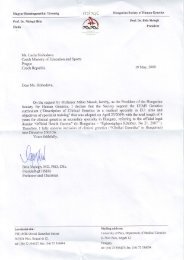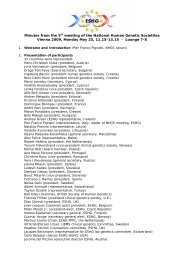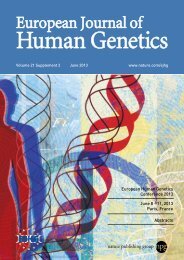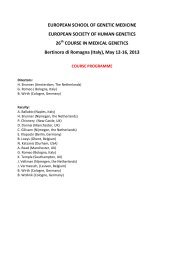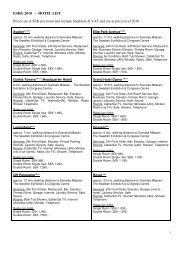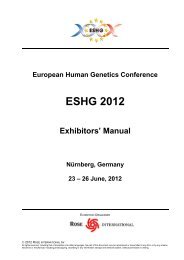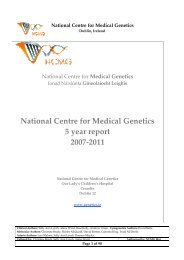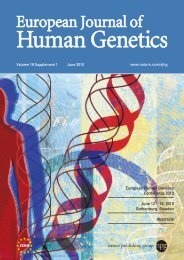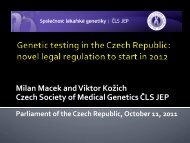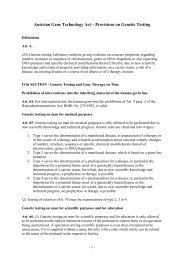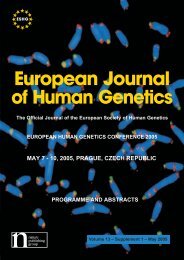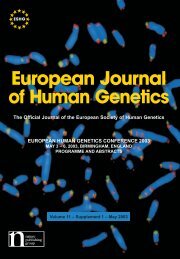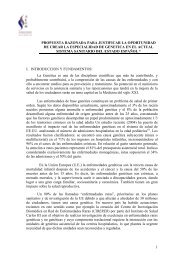2008 Barcelona - European Society of Human Genetics
2008 Barcelona - European Society of Human Genetics
2008 Barcelona - European Society of Human Genetics
Create successful ePaper yourself
Turn your PDF publications into a flip-book with our unique Google optimized e-Paper software.
EMPAG Posters<br />
Results: Preliminary results <strong>of</strong> this study, which is still ongoing, will be<br />
presented . It is anticipated from our clinical experience that emotional/<br />
character changes <strong>of</strong> the partner are most difficult to cope with, since<br />
the partner <strong>of</strong>ten becomes a “different” person to live with . Changes in<br />
personal life include mainly changes in the role model in the partner<br />
relationship . Healthy partners <strong>of</strong>ten experience the daily care and the<br />
material consequences <strong>of</strong> Huntington’s disease as a major burden for<br />
the future .<br />
EP13.7<br />
Psychosocial aspects <strong>of</strong> living with Long Qt syndrome. A<br />
qualitative study<br />
J. Andersen 1,2 , N. Oyen 1,3 , C. Bjorvatn 1,3 , E. Gjengedal 1 ;<br />
1 Department <strong>of</strong> Public Health and Primary Health Care, University <strong>of</strong> Bergen,<br />
Bergen, Norway, 2 Norwegian Porphyria Center, Haukeland University Hospital,<br />
Bergen, Norway, 3 Center for Medical <strong>Genetics</strong> and Molecular Medicine, Haukeland<br />
University Hospital, Bergen, Norway.<br />
Background: Long QT syndrome (LQTS) is a genetic disorder characterized<br />
by prolongation <strong>of</strong> the QT interval on the electrocardiogram,<br />
potentially leading to life-threatening arrhythmias and increased risk <strong>of</strong><br />
sudden death . In Norway LQTS patients and their families are <strong>of</strong>fered<br />
diagnostic or predictive genetic testing . Norwegian legislation states<br />
that genetic counseling is mandatory in connection with genetic testing<br />
<strong>of</strong> healthy individuals .<br />
Purpose: The purpose <strong>of</strong> this qualitative study was to<br />
- Investigate the psychosocial aspects <strong>of</strong> living with LQTS<br />
- Describe LQTS patients’ experiences with healthcare services .<br />
Material and methods: In-depth interviews with seven Norwegian<br />
adults tested for long QT genetic mutations, was conducted . Four participants<br />
had an implantable cardiac defibrillator (ICD).<br />
Results: Participants experienced worries and limitations in daily life<br />
and it was a general wish among them to be able to talk to someone<br />
with the same condition . Their main concern was not for their own<br />
health but for their children or grandchildren . Having an ICD was experienced<br />
as an additional safety but it could also cause social embarrassment<br />
and anxiety . Early and gradually acquired knowledge <strong>of</strong><br />
the syndrome was reported as an advantage . Healthcare providers’<br />
minimal knowledge <strong>of</strong> LQTS resulted in uncertainty, misinformation,<br />
and even wrong advice on treatment .<br />
Conclusion: Knowledge <strong>of</strong> the challenges met by this patient group<br />
is important in order to provide adequate genetic counseling . Further<br />
investigations into the psychosocial aspects <strong>of</strong> LQTS are desirable .<br />
EP13.8<br />
Unmet information and support needs amongst individuals<br />
affected by one <strong>of</strong> two rare cancer syndromes: mEN2A and VHL<br />
N. A. Kasparian 1,2 , A. Rutstein 3,2 , B. Meiser 3,2 , J. Koehler 4 , J. Tyler 4 , K. Tucker 4 ;<br />
1 School <strong>of</strong> Women’s and Children’s Health, University <strong>of</strong> New South Wales,<br />
Kensington, NSW, Australia, Kensington, Australia, 2 Department <strong>of</strong> Medical<br />
Oncology, Prince <strong>of</strong> Wales Hospital, Randwick, Australia, 3 Prince <strong>of</strong> Wales<br />
Clinical School, University <strong>of</strong> New South Wales, Kensington, NSW, Australia,<br />
Kensington, Australia, 4 Hereditary Cancer Clinic, Prince <strong>of</strong> Wales Hospital,<br />
Randwick, Australia.<br />
Multiple endocrine neoplasia type 2A (MEN2A) and von Hippel Lindau<br />
syndrome (VHL) are rare, inherited, early onset cancer syndromes<br />
characterised by the development <strong>of</strong> tumours in one or more parts <strong>of</strong><br />
the body . Genetic testing is typically carried out in young children with<br />
a family history <strong>of</strong> either condition. Individuals identified as gene carriers<br />
undergo lifelong surveillance in order to detect tumours at an early<br />
stage . Little is known, however, about the psychosocial experiences <strong>of</strong><br />
individuals affected by MEN2A or VHL . This study aims to identify the<br />
unmet information and support needs <strong>of</strong> individuals affected by these<br />
rare cancer syndromes. Patients with a confirmed diagnosis <strong>of</strong> MEN2A<br />
or VHL were ascertained via the Hereditary Cancer Clinic at Prince <strong>of</strong><br />
Wales Hospital, NSW, Australia . A semi-structured individual interview<br />
was developed to assess five broad themes: impact <strong>of</strong> MEN2A/VHL<br />
on various life domains such as relationships, education and employment;<br />
attitudes towards childbearing; coping strategies; family communication<br />
about the disease; and unmet information and support needs .<br />
Interviews with approximately 20 patients and 16 caregivers are currently<br />
underway, with 16 completed patient interviews and 8 completed<br />
caregiver interviews . Data will be analysed separately for patients and<br />
caregivers, using qualitative data analysis s<strong>of</strong>tware, QSR N6. Partic-<br />
ular focus will be placed on potential thematic differences between<br />
cancer groups and genders . These data will inform the development<br />
<strong>of</strong> a survey instrument, which we aim to administer on an international<br />
scale through collaborations with the Association for Multiple Endocrine<br />
Neoplasia Disorders (AMEND) and the VHL Family Alliance .<br />
EP13.9<br />
managing relationship needs while living with chronic genetic<br />
illness<br />
F. Pearce;<br />
Genetic Health, Parkville, Victoria, Australia.<br />
The special care requirements <strong>of</strong> children, who progressively become<br />
physically and intellectually disabled due to metabolic illness, can be<br />
emotionally and physically overwhelming .<br />
All family relationships are under pressure in these circumstances . At<br />
the same time, people discover capabilities and strengths that would<br />
rarely be known about or used, under more normal situations .<br />
Often, the sick child’s primary care-giver (usually their mother) has to<br />
make choices from several competing needs at the one time . How<br />
are these choices made? On what basis are they prioritised? A great<br />
number <strong>of</strong> relationships fail in these circumstances, however others<br />
are awe inspiring .<br />
This presentation will include case material that demonstrates how<br />
some couples cope and how others feel forced to ‘give up’ .<br />
EP14. Other relevant psychological and<br />
social topics in genetics<br />
EP14.01<br />
mental representations <strong>of</strong> pregnant women with advanced<br />
maternal age (AmA) who undergo amniocentesis: a unique<br />
dynamic process<br />
A. S. Leonardo1 , J. Justo2 , I. Cordeiro1 ;<br />
1 2 Hospital Santa Maria, Lisboa, Portugal, Faculdade Psicologia e Ciências de<br />
Educação, Universidade de Lisboa, Lisboa, Portugal.<br />
Non routine medical procedures, such as amniocentesis, have been<br />
suggested to have an emotional impact on pregnant women . Anxiety<br />
is an obvious consequence, the psychological “suspension” <strong>of</strong> the<br />
pregnancy might be another one . We propose that the process <strong>of</strong> accepting<br />
the reality <strong>of</strong> gestation and the reality <strong>of</strong> the foetus, expected<br />
to occur respectively in the first and second trimester, is postponed in<br />
AMA women who undergo amniocentesis until after the result comes<br />
through .<br />
Building mental representations about the foetus is an important part<br />
<strong>of</strong> the psychological process that takes place during pregnancy . In fact,<br />
some studies have questioned the importance <strong>of</strong> these representations<br />
for the quality <strong>of</strong> the mother-baby relationship/ interaction . Amniocentesis<br />
is thus performed during a crucial period <strong>of</strong> intense and<br />
dynamic internal activity . The purpose <strong>of</strong> this study was to understand<br />
how does this procedure influence the dynamic process by which AMA<br />
women build representations <strong>of</strong> the foetus as their “child-to-be” .<br />
We applied an adaptation <strong>of</strong> Interview R to a group <strong>of</strong> 35 pregnant<br />
AMA women (A) and a control group (NA), before and after amniocentesis<br />
. Before amniocentesis, group A gave “less rich” and “less<br />
positive” descriptions <strong>of</strong> their future babies, and characterised them<br />
as “less active” and “quieter” . After the results were known, the only<br />
difference between the two groups was that NA women continued to<br />
describe their future children in a more positive way .<br />
These findings suggest that the dynamic process <strong>of</strong> maternal mental<br />
representations is unique in AMA women who undergo amniocentesis<br />
.<br />
EP14.02<br />
GeneBanc. studying the ethical, legal and social aspects <strong>of</strong><br />
Biobanking<br />
P. Borry, K. Dierickx;<br />
Centre for Biomedical Ethics and Law, Leuven, Belgium.<br />
Background . The last few years have witnessed an important expansion<br />
<strong>of</strong> collection and processing <strong>of</strong> human biological samples and <strong>of</strong><br />
the related information data . Biobanks are huge repositories <strong>of</strong> human<br />
biological specimens and have a strategic importance for genetic research,<br />
clinical care and future treatments .



